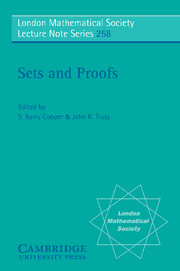Book contents
- Frontmatter
- Contents
- Preface
- An Introduction To Finitary Analyses Of Proof Figures
- What Mathematical Truth Could Not Be – II
- Proof Search in Constructive Logics
- David's Trick
- A Semantical Calculus for Intuitionistic Propositional Logic
- An Iteration Model Violating the Singular Cardinals Hypothesis
- An Introduction to Core Model Theory
- Games of Countable Length
- On the Complexity of the Propositional Calculus
- The Realm of Orinal Analysis
- Covering Properties of Core Models
- Ordinal Systems
- Polish Group Topologies
- Forcing Closed Unbounded Subsets of Nw+1
- First Steps into Metapredicativity in Explicit Mathematics
- What Makes A (Pointwise) Subrecursive Hierarchy Slow Growing?
- Minimality Arguments for Infinite Time Turing Degrees
On the Complexity of the Propositional Calculus
Published online by Cambridge University Press: 05 September 2013
- Frontmatter
- Contents
- Preface
- An Introduction To Finitary Analyses Of Proof Figures
- What Mathematical Truth Could Not Be – II
- Proof Search in Constructive Logics
- David's Trick
- A Semantical Calculus for Intuitionistic Propositional Logic
- An Iteration Model Violating the Singular Cardinals Hypothesis
- An Introduction to Core Model Theory
- Games of Countable Length
- On the Complexity of the Propositional Calculus
- The Realm of Orinal Analysis
- Covering Properties of Core Models
- Ordinal Systems
- Polish Group Topologies
- Forcing Closed Unbounded Subsets of Nw+1
- First Steps into Metapredicativity in Explicit Mathematics
- What Makes A (Pointwise) Subrecursive Hierarchy Slow Growing?
- Minimality Arguments for Infinite Time Turing Degrees
Summary
Abstract
We show that research into the complexity of propositional proofs is related to various problems in other branches of mathematics. A nondeterministic procedure for a coNP-complete can be viewed as a propositional proof system. We survey several proof systems which were proposed for problems in integer linear programming, algebra and graph theory. Then we consider a general method of proving lower bounds on the lengths of propositional proofs which is based on a property of some systems called effective interpolation. This means that the circuit complexity of interpolating boolean functions f(x) of an implication ø(x, y) →φ(x, z) can be bounded by a polynomial in the length of a proof of the implication. We shall prove such a theorem for a system for integer linear programming proposed by Lovász and Schrijver [34] and show a relation between a problem on the complexity of linear programming and a problem of proving lower bounds on the lengths of proofs in this system. We shall consider the lengths of proofs in nonclassical logics, in particular monotone and intuitionistic logics, and, in a similar way, show a relation to the complexity of sorting networks.
- Type
- Chapter
- Information
- Sets and Proofs , pp. 197 - 218Publisher: Cambridge University PressPrint publication year: 1999
- 27
- Cited by

